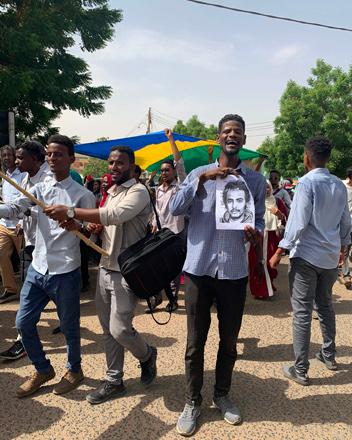You are here
Sudan protest leaders call for strike from Tuesday
By AFP - May 26,2019 - Last updated at May 26,2019

Sudanese medics shout slogans as they hold a rally in front of a hospital in the capital Khartoum on Thursday (AFP photo)
KHARTOUM — Sudan's protest leaders have called for a two-day general strike starting on Tuesday amid deadlock in talks with the ruling army generals on installing civilian rule, the key demand of demonstrators.
The umbrella protest movement, which led nationwide demonstrations against former leader Omar Al Bashir that led to his ouster on April 11, is at odds with the generals over the forming of a new governing body.
"There is no longer any alternative to using the weapon of a general strike," the Alliance for Freedom and Change said in a statement on Friday.
It said the strike, affecting "public and private institutions and companies", would be accompanied by civil disobedience and was "an act of peaceful resistance with which we have been forced to proceed".
Talks between the protest leaders and generals have been suspended since Monday after a disagreement over who should lead the new authority — a civilian or an officer.
The generals who seized power after Bashir was toppled have resisted calls from the demonstrators and the international community to step down.
Meeting demonstrators
The protest alliance said that on Saturday its leaders will hold meetings with demonstrators at the sit-in outside the military headquarters to consult the demonstrators on how to end the deadlock in talks with the generals.
Thousands of protesters remain camped at the sit-in demanding that the generals who seized power after ousting Bashir step down.
The Alliance for Freedom and Change has also called for rallies from residential areas in Khartoum heading towards the sit-in on Sunday.
On Thursday, employees of several companies as well as government institutions, including the central bank, held spontaneous demonstrations in parts of the capital in support of the protest movement.
Several rounds of talks have so far failed to finalise the makeup of the new ruling body, with both the generals and protest leaders insisting on their demands.
Western nations like the United States, Britain and Norway have consistently called on the generals to hand over power to a civilian administration, while the ruling army council has received support from regional allies like Saudi Arabia and the United Arab Emirates.
Days after Bashir was ousted, oil-rich Gulf states Saudi Arabia and the United Arab Emirates pledged to inject $500 million into Sudan's central bank and $2.5 billion to help provide food, medicine and petroleum products.
They said the move was aimed at shoring up the Sudanese pound.
In recent years Sudan has been hit by an acute lack of dollars, a key factor behind the nationwide protests that first erupted in December and led to the toppling of Bashir.
But the Western troika, which has previously been involved in mediation in Sudanese conflicts, reiterated this week that the two sides reach an agreement urgently.
"Any outcome that does not result in the formation of a government that is civilian-led, placing primary authority for governing with civilians, will not respond to the clearly expressed will of the Sudanese people for a transition to civilian rule," the United States, Britain and Norway said in a joint statement.
"This will complicate international engagement, and make it harder for our countries to work with the new authorities and support Sudan's economic development."
Related Articles
KHARTOUM — Hundreds of travellers remained stranded in the Sudanese capital on Wednesday as bus terminal staff stopped work for a secon
KHARTOUM — Hundreds of Sudanese university students chanting “civilian rule, civilian rule” rallied in downtown Khartoum on Tuesday see
KHARTOUM — Sudanese army rulers and protesters failed on Tuesday to reach an agreement yet again on the make-up of a new ruling body a
















